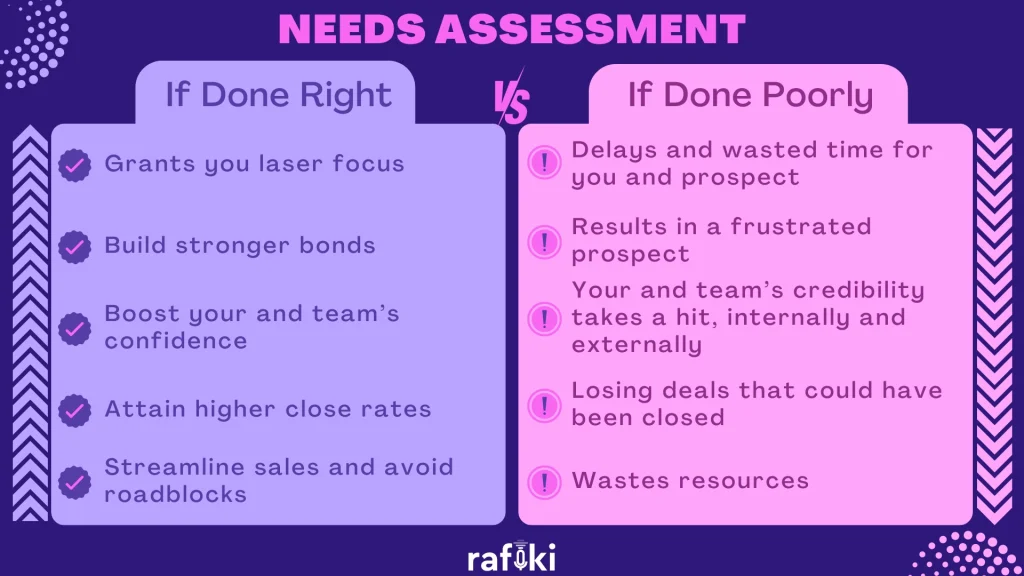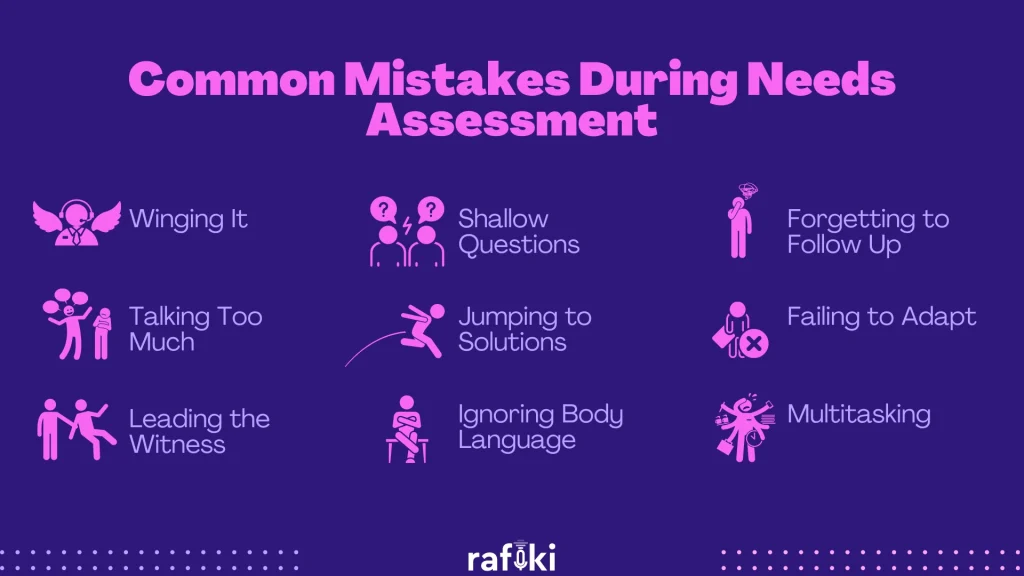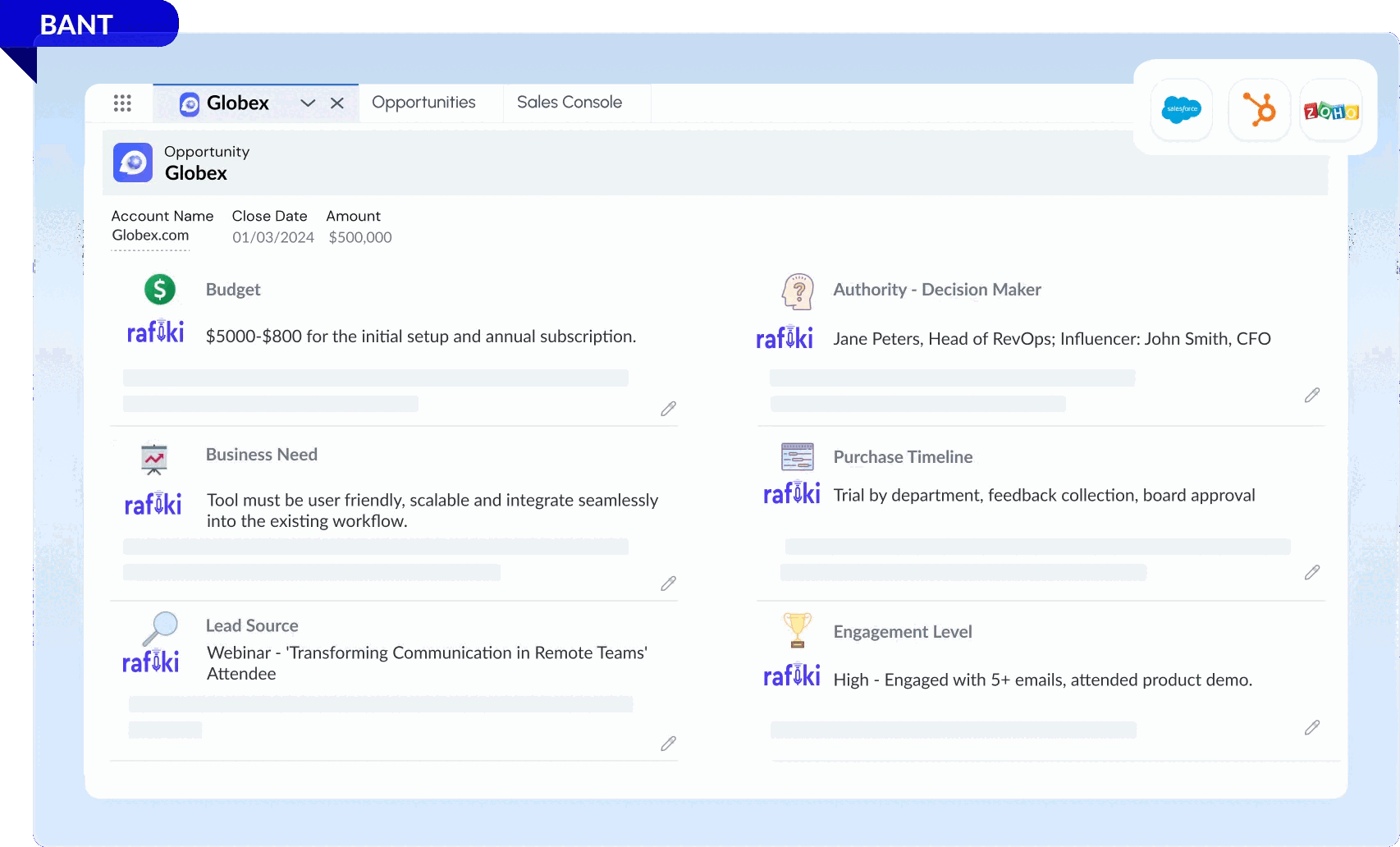Why Rafiki
Pricing


Pricing
Solutions

RevOps Leaders
Synchronize revenue generating functions

SDR Leaders
Get your team aligned and Coach your Reps 3x faster at scale

Sales Leaders
Unlock pipeline truth, drive confident forecasts

Discovery calls are the cornerstone of a thriving sales pipeline. But simply connecting with prospects isn't enough. To truly resonate and convert leads, you need to do a thorough needs assessment.
This guide dives into the art of the needs assessment, exploring its importance, common pitfalls, and the secret questions top sales reps leverage to close more deals.
So, let's dive in!
Discovery calls shouldn't be a guessing game. A well structured discovery call will have 4 steps, namely Introduction and Rapport Building, Needs Assessment, Solution Presentation & Next Steps and Confirmation. The Needs Assessment step is the heart of every discovery call, as everything starts from and depends on it.
Here’s what happens when needs are assessed properly and when they're assessed poorly:

A well-executed needs assessment unlocks a treasure chest of benefits:
But a sloppy needs assessment comes with a hefty price tag:

Even the most seasoned sales reps can fall into pitfalls during needs assessments. So, here are 9 common mistakes to watch out for:
Relying on generic questions and hoping for the best is a recipe for disaster.
This drowns out valuable insights from your prospect. Remember, it's about listening, not lecturing. Rafiki can accurately track your Talk to Listen ratio and help optimize it against benchmarks.
Those pre-written questions designed to steer the conversation towards your product? Leave them behind.
Don't settle for surface-level answers. Dig deeper with probing questions to uncover the "why" behind their needs.
Hold off on pitching your product until you fully grasp their situation.
Crossed arms, glazed eyes - these nonverbal cues can reveal a lack of engagement or hidden concerns.
Don't let the momentum die! Rafiki’s Smart Follow Up can automatically craft highly personalized follow ups to maximize engagement and keep understanding prospect’s needs through further dialog.
Every prospect is unique. Don't get stuck in a one-size-fits-all questioning routine.
Put your phone away and give your prospect your undivided attention. This shows respect and helps you actively listen.
These mistakes can derail your discovery call and leave you empty-handed. By staying mindful of these pitfalls, you'll be well on your way to conducting a needs assessment worthy of a seasoned pro.
A well-conducted needs assessment is the cornerstone of a successful sales conversation. Here are 15 insightful questions designed to unearth your prospect's deepest needs and tailor your solution accordingly:
1. "How are you currently measuring success in this area? Are you satisfied with those metrics?" - Reveals their priorities and potential dissatisfaction with current solutions.
2. "Looking back at the past quarter or year, what was a missed opportunity or lost sale that you attribute to [potential problem area]?" - Uncovers past regrets and opportunities for improvement.
3. "Can you describe a recent instance where a competitor's solution either impressed or fell short of your expectations?" - Provides insights into their competitive landscape and ideal solution features.
4. "Can you describe a time when a vendor truly understood your needs and exceeded your expectations?" - Provides insights into their ideal customer experience and allows you to mirror it.
5. "What are some of the industry trends you're following most closely, and how do they impact your current approach?" - Demonstrates your understanding of their industry and positions your solution as future-proof.
1. "Beyond the surface, what keeps you up at night when it comes to [prospect's area of responsibility]?" - This goes beyond basic challenges and taps into underlying anxieties.
2. "If you could wave a magic wand and instantly improve one aspect of your current workflow, what would it be?" - Identifies a specific pain point and desired outcome.
3. "Imagine you have unlimited resources for a day. How would you invest those resources to address your current challenges?" - Reveals their ideal approach and uncovers hidden desires.
4. "Within your team, are there any differing opinions on how to best tackle this challenge? Can you elaborate?" - Identifies internal conflicts and allows you to position your solution as a bridge between them.
5. "What are some of the long-term consequences of not addressing this challenge now?" - Highlights the potential for future problems and positions your solution as proactive.
6. "Beyond cost, what are some of the biggest hurdles you anticipate when implementing a new solution?" - Uncovers potential roadblocks and allows you to address them proactively.
1. "How would a successful solution empower your team members to be more productive and achieve their goals?" - Shifts the focus to the positive impact on their team and overall efficiency.
2. "What are some of the unseen benefits you'd hope to achieve by implementing a solution like ours?" - Uncovers their unspoken goals and allows you to showcase how your solution delivers unexpected value.
3. "Who within your organization would be most impacted by a successful solution, and why?" - Helps you identify key decision-makers and tailor your pitch accordingly.
4. "Imagine we're a year from now, and your team is experiencing remarkable success. What specific metrics or achievements would mark that success for you?" - Paints a picture of their ideal future and allows you to connect your solution to their vision of triumph.
Imagine navigating a complex maze blindfolded. That's what a needs assessment can feel like without a clear tracking system. While asking insightful questions is very important, so is capturing key details, lest you risk losing your way and missing crucial information.
Traditionally, note-taking has been the go-to method. But scribbling furiously during a conversation can be distracting and lead to missed details. Rafiki's Smart Call Summary offers a powerful alternative.
Rafiki automatically transcribes your entire call, summarizing key points with remarkable human-grade accuracy. No more scrambling to decipher your own handwriting or worrying about missing a golden nugget of information. Rafiki captures it all: challenges voiced by the prospect, desired outcomes, and any specific details that emerge during the conversation.
But the benefits don't stop there. Rafiki's Smart CRM Sync seamlessly integrates with your existing CRM platform. As Rafiki analyzes your call summary, it automatically populates relevant fields in your CRM based on the needs assessment discussion. This ensures critical information, especially related to your sales qualification methodology – like budget constraints, decision-makers, and key timelines – is accurately captured and readily accessible.

No more tedious post-call data entry. Rafiki takes care of the heavy lifting, allowing you to focus on what matters most: building rapport and uncovering the deepest needs of your prospect. Moreover, with a clear roadmap provided by Rafiki, you can navigate the needs assessment with confidence, ensuring a productive and insightful discovery call.
The discovery call is your chance to truly understand the prospect and their story. By prioritizing a well-structured needs assessment, you'll not only uncover your prospect's deepest challenges, but also qualify them as a potential customer.
Accurately Assess & Track Prospect Needs
Keep in mind, it's about asking insightful questions, actively listening, and diligently tracking the conversation. Rafiki empowers you throughout this process, from automatically summarizing key points to syncing vital information with your CRM. So, invest in mastering the needs assessment, leverage the power of Rafiki, and watch your conversion rates soar.